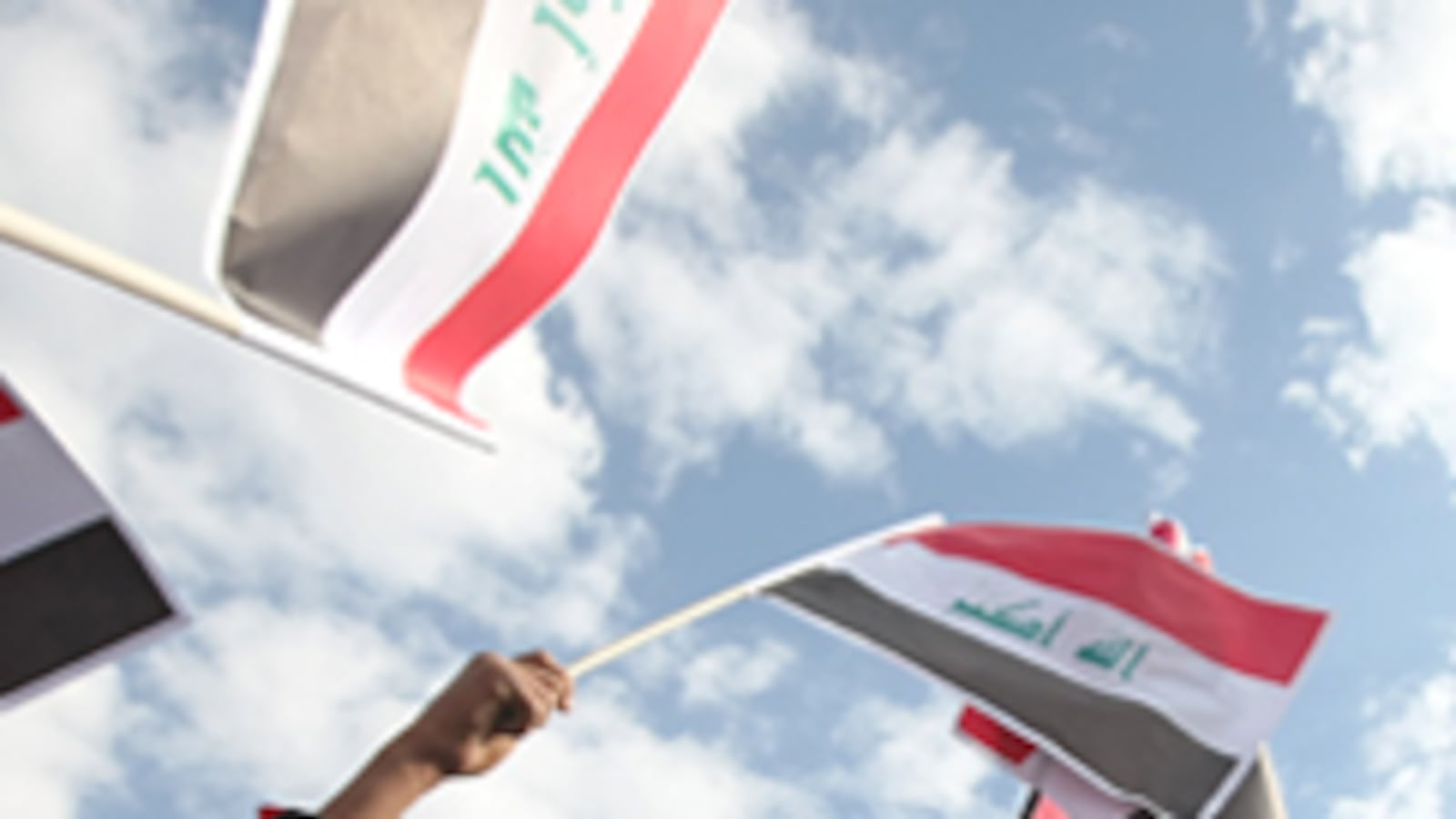
Iraqi militants have stepped up their game in anticipation of Sunday's national election, with twice as many people dead from violence in February as in the previous month. On Wednesday, a series of three bomb blasts killed at least 30 people and wounded 45 in the city Baquba, northeast of Baghdad. Still, American officials predict a bright democratic future for Iraq. Don’t believe the hype. Michael Hastings on the ominous signs of a return to darker days.
American officials will trumpet the results of this Sunday’s election in Iraq, no matter the outcome. Expect, too, a rash of commentary and columns from once-upon-a time war supporters who are now quietly taking the first tentative steps to reclaim their original positions. (Subtext: The war was um,er,uh, horrible and everything, but we were right after all…) We’ll be told that Iraq is on the road to freedom and our American troops are coming home. Sure, there will be some bumps—the equivalent of an Oklahoma City-style attack every few months, and yeah, maybe technically the troops aren’t really coming home (there will likely be a presence of 30,000 to 50,000 American troops in Iraq for years to come)—but the war is more or less over.
Here’s a word of caution: don’t be fooled.
I suspect we could be seeing Iraq’s final gasp of democracy this weekend, a last purple-fingered salute before the country slips back into a more familiar authoritarianism.
I’ve spent a number of months in Iraq covering the run up to the elections, and I’ll be there on March 7th to see the results. I’ve spoken to dozens of Iraqi officials, U.S. diplomatic and military types, scores of Iraqi voters, and some of Prime Minister Nouri al-Maliki’s closest friends and advisors. All of which has made me very suspicious of the American claim—made recently by Vice President Joe Biden when he said Iraq might be one of President Obama’s “greatest achievements—that Iraq’s democratic future is sunny, peaceful, and bright.
In fact, I suspect we could be seeing Iraq’s final gasp of democracy this weekend, a last purple-fingered salute before the country slips back into a more familiar authoritarianism. It’s not this election we need to worry about, in other words—it’s the next one, four years from now.
• Tunku Varadarajan: Iraq’s Political MiracleThis uncomfortable truth was hard to ignore after the Iraqi government banned hundreds of candidates—mostly secular and Sunni leaders—from running in the election. The move was supported by Maliki, and it took the direct intervention of Vice President Biden to force the Iraqis to ban only 400 rather than the original 500. The Shiite Islamist-dominated government in Baghdad was sending a clear signal to its political opponents: they’re not very interested in reconciliation. (The U.S. “surge” strategy was intended to give the Iraqi government what U.S. officials called “political breathing room.” The Iraqi government has now made it clear they are going to use the breathing room to choke whatever air is left out of the opposition.) It seems rather unlikely that, in four years from now, when the Americans have even less influence in shaping events, that the Iraqi government will be more willing to share in the democratic way the Americans are hoping for.
The candidate ban was the culmination of trends that American officials wanted to pretend were insignificant: a return of sectarianism in politics after a brief lull in last year’s provincial elections. A prime minister who had become increasingly authoritarian. The persecution of leaders in the Sunni Awakening movement. Regular reports of politically motivated detentions and disappearances. Persistent rumors of a coup, and targeted assassinations of political, religious and community leaders—all punctuated regularly by massive and well-coordinated car bombings. All of that could be brushed aside as annoying details—as Senators Lieberman and McCain did on their latest trip to Baghdad, when they repeatedly claimed, with straight faces, that Iraq was a “model" for democratic self-government." The precarious state of Iraq’s democracy was driven home to me when I was sitting in the headquarters of the Independent High Electoral Commission, or IHEC. One would expect IHEC to be ground zero for Western-style liberal democracy—it’s the body in charge of overseeing free and fair elections for the entire country. I was talking to a Kurdish election official who worked there. “I would vote for Saddam Hussein if I could,” the official told me. “Ninety-nine percent of the people in this office would vote for Saddam if he was on the ballot.” (A number of IHEC workers have been killed and kidnapped throughout the campaign season.)
The public—at least in Baghdad—seems to be rather sick of democracy, too. It’s hard to blame them. This will be the sixth change of government in Iraq in seven years—and the turnover has been a primary cause of much of the chaos, violence and instability. A recent poll showed that only 22 percent of Baghdadis planned to vote. (Caveat: the city will shut down for four days before the vote for security reasons, and so the turnout might be higher because there won’t be much else to do.) At a food ration distribution center in Baghdad I visited—they are responsible for handing out voter cards—the man in charge said he had only distributed approximately 300 of the 1,400 cards available to eligible voters. “No one cares about this election,” he told me. “The only people who have picked up cards work for the government.” (While at a press conference, the American general in charge of Sunni reconciliation, Major General Joseph Reynes, said that he believed the Iraqis were “excited” about the election.)
For another troubling sign of elections to come, just look at the not atypical experience of the newly formed Ahrar Party. Ahrar, run by Shiite cleric Jamal Ayad Aldin, is secular, pro-Western and anti-Iranian. Two weeks ago, on a Saturday night in Baghdad, four Ahrar workers tried to put up posters of their candidate in Sadr City. Before finishing the job, they were detained for 24 hours by an Iraqi Army unit. Three days later, in the northern city of Mosul, five of Ahrar’s campaign workers were interrupted while placing a 12 by 5 meter billboard—unknown gunmen opened fire on them. The following morning, one of the candidates running on their list was ambushed by an armed militia in the eastern province of Maysan—the candidate escaped but his bodyguard was killed. “It is an extremely disturbing situation we have, once again, been faced with,” Ahrar’s leader, Jamal Ayad Aldin said. “The current government and our opponents will stop at nothing to prevent a fair and democratic election.”
Maliki’s career is also an interesting test case for Iraq’s would-be future democratic leaders. He’s been most successful when he plays the role of the strong man. When he tried to be non-sectarian, he lost his sectarian allies. When he tacked back towards sectarianism, he lost his non-sectarian allies. The only answer, according to his closest advisors, was to play rough. I asked one of his top advisors about the criticism that Maliki was behaving like a dictator (Iraqis, jokingly, already refer to one his sons, Ahmed, as Uday, in reference to Saddam’s son). “Sometimes, we have to act like dictators,” he said.
Maliki might not have the political skills to pull off the strongman act—he could lose his job as PM—but somebody else might. Rumors of a coup are a constant feature of life in Baghdad, and you can’t help think part of that is wishful thinking—a desire for someone to take charge and end the violence. What’s preventing a coup right now is the U.S. presence and the fact that there are too many armed factions; nobody could pull a coup off. (Privately, American officials concede a coup is something they do worry about happening at some point; the British Ambassador mistakenly expressed that fear publicly two months back and was chastised for it.) But, the presence of all the different armed factions almost ensures continued violence for years to come—therefore, the quickest way to stop the violence is to lock up, kick out, or kill your enemies. As the journalist Mark Danner perceptively wrote: "Saddam Hussein and the autocracy he ruled were the product of a dysfunctional politics, not the cause of it.”
It’s fitting that this election coincides with the Academy Awards. Thanks to the Hurt Locker, the debate about the war has moved from policy wonks to film critics. It’s now about creating a narrative while we prepare to roll the credits. The military has shifted its focus to Afghanistan, and the anti-Iraq War candidate Obama has always felt a little awkward with the war since becoming commander in chief. There’s no denying what seems to be our nation’s collective desire to put the war behind us. The elections—which will, in theory, set the tone for the post-American occupation of Iraq—provide us with a punctuation point to a narrative scrubbed clean of the past seven years. The desire to declare victory and come home seems overwhelming. So, prepare to be told that we’re on our way to a happy ending. Just remember that it probably won’t be very democratic.
Michael Hastings is a regular contributor to GQ and the author of I Lost My Love in Baghdad: A Modern War Story. He is currently on assignment in Iraq.




